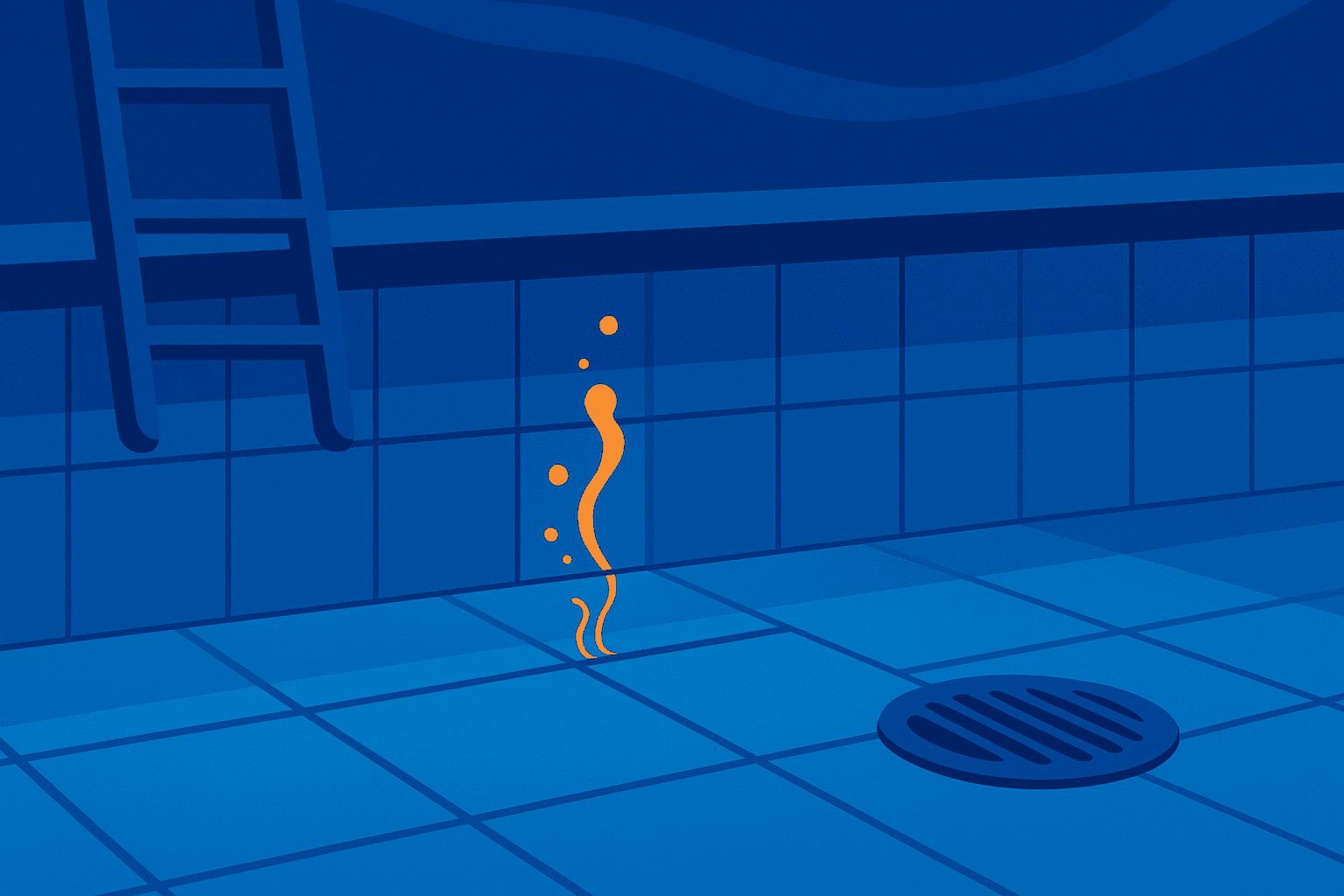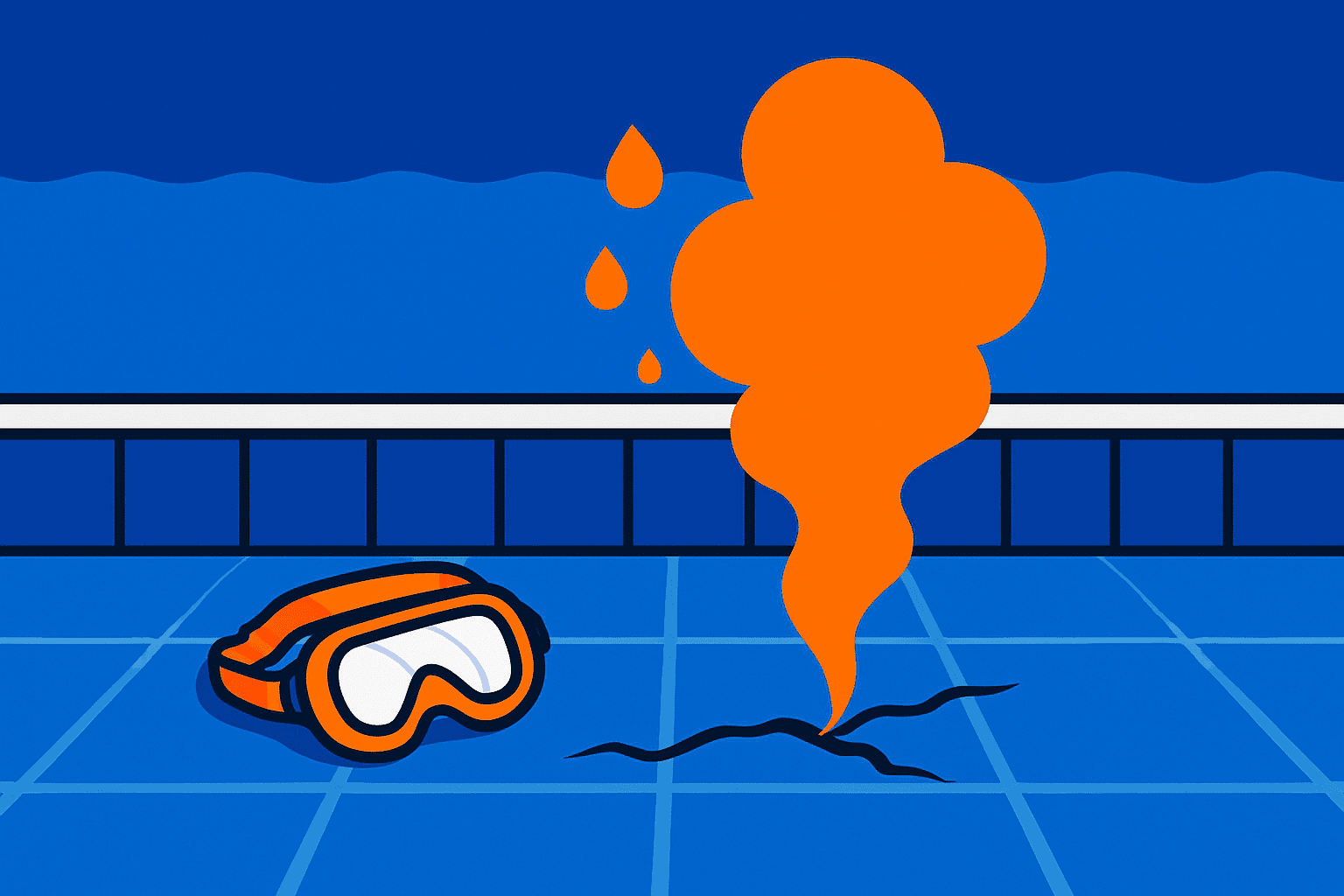Swimming Pool Leak Detection
Expert Swimming Pool leak detection services in Cornwall & Devon.
Contact Us Today!
Fast Reply Within 2 – 20 mins 🚀
↓ RESOLVE YOUR LEAK TODAY ↓
Swimming Pool Leak Detection in Cornwall & Devon
Losing more than 1/4 inch of water daily? My specialist pool leak detection equipment finds leaks without draining your pool – saving water, money, and your summer season📞Call Now: 07822 025 911
The Famous Bucket Test: Your First Line of Defence
🪣 DIY Pool Leak Test – Takes 24 Hours, Saves Hundreds
Before calling for professional pool leak detection services, try this simple test. It’s saved countless customers from unnecessary callouts:Set Up
Place a bucket on your pool step, weighted with a brick. Fill it to match your pool’s water level exactly.Mark Levels
Use tape to mark water level inside bucket and pool level on bucket exterior. Turn off auto-fill.Wait 24 Hours
No swimming, no rain. Let both water levels drop naturally through evaporation.Compare Results
Both drop equally = evaporation. Pool drops more = leak. Over 1/4 inch difference confirms it.Pro tip: Run the test twice – once with pump on, once off. If you lose more water with the pump running, the leak’s in your circulation system.
How Much Water Loss is Normal? Understanding Pool Evaporation vs Leaks
| Daily Loss | Annual Loss (Gallons) | Annual Cost | Plus Chemicals |
|---|---|---|---|
| 1/4 inch | 45,000 | £715 | £200 |
| 1/2 inch | 90,000 | £1,430 | £400 |
| 1 inch | 180,000 | £2,860 | £800 |
| 2 inches | 360,000 | £5,720 | £1,600 |

Types of Pools & Their Unique Leak Challenges
Concrete/Gunite Pools
Develop hairline cracks from ground movement. Common in older Devon properties. Expansion joints fail first. My pool leak detection company uses dye testing for visible cracks, pressure testing for plumbing.Liner Pools
Punctures from debris, seam failures after 10+ years. UV damage in Cornwall’s coastal areas. Electronic testing pinpoints tiny holes. Fix pool leak quickly before liner pulls away.Fibreglass Pools
Stress cracks around fittings, osmotic blistering. Ground water pressure causes flexing. Swimming pool leak detection and repair requires understanding gel coat properties.How to Find a Swimming Pool Leak: Detection Methods Explained
Professional swimming pool leak detection services need multiple approaches. Here’s what I bring to every job:🎨 Dye Testing
Special pool dye injected near suspected leaks. Watch it get sucked into cracks – simple but effective for structure leaks. Works on lights, returns, skimmers. Must be performed underwater for accuracy.🔧 Pressure Testing
Isolate and pressurise each pipe section to safe levels (never exceed 20 PSI). Pressure drop = leak location. My electronic gauges detect 0.1 PSI changes. Essential for underground pool leak detection and repair.🎧 Acoustic Detection
Hydrophones listen underwater, ground mics for buried pipes. Different from standard acoustic leak detection – pools need specialised equipment for underwater listening.🔍 Hydrophone Testing
Specialist underwater microphones for pool environments. Different from standard leak detection – designed for submerged listening. Detects turbulence from water escaping through cracks.Where Do Swimming Pool Leaks Occur? Common Problem Areas
Structural Leak Points:
- Skimmer Box: Where plastic meets concrete – expansion/contraction causes separation
- Return Fittings: Gaskets deteriorate, threads strip from vibration
- Pool Lights: Conduit seals fail, water follows electrical path
- Tile Line: Grout cracks from freeze-thaw cycles
- Steps & Benches: Hollow areas develop cracks from weight stress
- Expansion Joints: Sealant ages and pulls away from surfaces
Equipment Leak Sources:
- Pump Shaft Seals: Most common equipment leak – easy fix
- Filter Multiport Valves: O-rings fail, spider gaskets crack
- Heater Heat Exchangers: Corrosion causes pin holes
- Chlorinator Connections: Chemical damage to seals
- Backwash Lines: Often ignored but can leak underground
Underground Pool Plumbing: The Hidden Challenge
Most pool leaks aren’t in the pool – they’re underground. Return lines, suction lines, main drains – all buried, all vulnerable. Cornwall’s rocky ground and Devon’s clay both create unique challenges for pipe stability.Common Underground Leak Points:
- Pipe Joints: Glue fails over time, especially with ground movement
- Under Skimmers: Constant water flow erodes connections
- Main Drain Lines: Deepest pipes, highest pressure, hardest to access
- Return Jet Fittings: Vibration from pumps loosens threaded connections
- Light Conduits: Water follows electrical conduits back to junction boxes
- Hydrostatic Relief Valves: Springs fail, debris prevents proper sealing
⚠️ Warning Signs of Underground Pool Leaks:
- Soft or sunken areas around pool deck
- Pool deck cracks radiating from pool edge
- Water features losing prime frequently
- Air bubbles from return jets (sucking air through crack)
- Pump running dry despite adequate water level
Swimming Pool Leak Detection and Repair Process

Step 1: Initial Assessment
Check equipment first – pump seals, filter gaskets, valve stems. Visual inspection of pool structure, looking for cracks, loose tiles, gaps around fittings. Many “leaks” are just equipment drips easily fixed. Run pump to check for air bubbles indicating suction leaks.Step 2: Water Loss Verification
Measure actual loss rate, compare with evaporation. Check auto-fill meters if installed. Review water bills for usage spikes. Sometimes pools aren’t leaking – overflow drains stuck open, backwash valves leaking. Eliminate simple causes first.Step 3: Systematic Testing
Start with dye tests around all fittings, lights, returns. Move to pressure testing if structure’s sound. Each line isolated and tested separately. Mark findings on pool diagram. For pool leak detection near me searches, customers want thorough, professional service.Step 4: Report & Repair Quote
Detailed findings with photos, exact leak locations marked. Repair recommendations with costs. Some fixes are simple – tighten a fitting, replace a gasket. Others need excavation or liner patches. I’ll explain options, never oversell repairs.Seasonal Impact on Pool Leaks in Cornwall & Devon
Our Maritime Climate Creates Unique Challenges
☀️ Summer Challenges
- Higher evaporation masks small leaks
- Increased pool use stresses fittings
- Ground shrinkage opens pipe joints
- UV damage accelerates liner deterioration
- Chemical balance harder to maintain with leaks
❄️ Winter Damage
- Freeze-thaw cycles crack concrete
- Ground heave shifts buried pipes
- Standing water in pipes expands when frozen
- Cover pumps mask developing leaks
- Storm damage to pool surrounds
That’s why I recommend swimming pool leak detection services before closing for winter and after spring opening. Catch problems early, avoid major repairs.
Pool Leak Prevention: Protecting Your Investment
🛡️ Annual Maintenance Prevents Costly Leaks
When to Call Professional Pool Leak Detection Services
Some leaks scream for attention – 2 inches daily loss, visible cracks, soggy lawns. Others whisper – slightly higher bills, minor chemical imbalance, occasional air bubbles. Both need addressing, but urgency varies.Call Immediately If:
- Losing more than 1 inch daily
- Structural cracks appearing or widening
- Pool deck sinking or separating
- Electrical issues near pool lights (water following conduits)
- Complete loss of prime in pumps
Schedule Soon If:
- Bucket test confirms leak under 1/2 inch daily
- Auto-fill running more frequently
- Chemical use increased significantly
- Small air bubbles in returns
- Tiles coming loose
Why Choose DCI for Swimming Pool Leak Detection?
Pool leak detection requires different skills than standard water leak detection.What Sets Us Apart:
- Multi-Method Approach: Never rely on one technique – pools are complex systems
- Minimal Disruption: Advanced techniques reduce need for draining in most cases
- Clear Quotes: Full assessment and quote before any work begins
- Insurance Reports: Detailed documentation for trace and access claims
- Repair Coordination: Connect you with trusted pool repair specialists
Stop Your Pool Draining Your Wallet
Every day that leak runs costs money – water, chemicals, heat, and potential structural damage. Whether you need swimming pool leak detection and repair or just peace of mind, I’ll find the problem without draining your pool or your bank account.Available across Cornwall & Devon Same-week appointments • Insurance approved • Fixed quotes
Swimming Pool Leak Detection Coverage
Based in Saltash, covering all pool types across the Southwest. From hotel pools to home spas, if it holds water and it’s leaking, I’ll find it. Emergency callouts available for severe water loss.Professional Pool Leak Detection Services Throughout Cornwall & Devon
Serving swimming pool owners in all major areas: Plymouth • Exeter • Truro • Torquay • Paignton • Barnstaple • Newton Abbot • St Austell • Falmouth • Penzance • Camborne • Redruth • Tiverton • Newquay • Brixham • Bodmin • Teignmouth • Helston • Bideford • St Ives • Dartmouth • Hayle • Tavistock • Saltash • Okehampton • Launceston • Totnes • Liskeard • Kingsbridge • Wadebridge
Frequently Asked Questions About Swimming Pool Leak Detection
How long does swimming pool leak detection take?
Most swimming pool leak detections take 2-6 hours to complete. Simple pressure tests and dye testing can be done in 2 hours, while complex underground pipe leaks may require 4-6 hours. Weather conditions and pool size affect timing – larger pools or wet ground can extend the process.
Can you detect pool leaks in winter?
Yes, we can detect pool leaks year-round, but winter detection is more challenging. Cold weather reduces leak sound transmission, and frozen ground affects tracer gas migration. We recommend covering pools before detection and may need longer timeframes in temperatures below 5°C.
Will insurance cover swimming pool leak detection?
Many UK home insurance policies cover leak detection under “trace and access” provisions. You’ll need professional reports with precise leak locations and photographic evidence. Check your policy wording – some require pre-approval before commissioning detection services.
How accurate is swimming pool leak detection?
Professional pool leak detection achieves 95-98% accuracy when proper methods are used. Hydrophone testing on pressurised systems reaches 98% accuracy, while tracer gas detection achieves 95% success rates. Success depends on leak size, depth, and ground conditions.
Can heavy rain affect pool leak detection?
Yes, heavy rain significantly impacts detection accuracy. Wait 48 hours after rainfall before scheduling detection. Saturated ground masks acoustic signals and dilutes tracer gas concentrations. Dye testing becomes impossible in rain-disturbed water.
How often should pools be checked for leaks?
Annual leak checks are recommended for pools over 10 years old. Newer pools should be checked every 2-3 years. Schedule immediate checks if you notice water loss exceeding 5cm per week, unexplained wet patches, or significant increases in water bills.
What causes most swimming pool leaks?
Skimmer box failures account for 40% of pool leaks, followed by pipe joint failures (25%) and pool shell cracks (20%). In Cornwall and Devon, ground movement from clay expansion causes most structural leaks, while coastal areas see increased corrosion-related failures.
